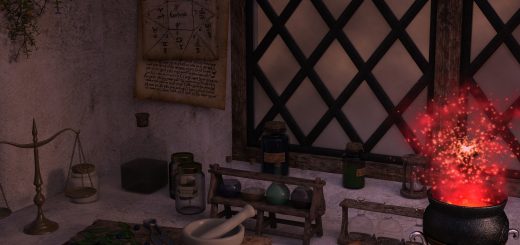Green with Envy
You must be wary of Envy, both within yourself and in your players. Envy is particularly dangerous as it tends to recursively feed upon itself. Envy tends to spread from player to player, and even more dangerously from game master to player.
The GM-PC Problem and the Envy Spiral
Many aspiring referees do not easily or gracefully make the transition from playing one character to playing the multiplicity of roles demanded by the act of running an entire world. They long for the simplicity of the player’s role, and they never realize how enjoyable and rewarding cameos and bit parts can be. Instead, their reluctance to give up the player’s part, their envy of that position, leads them to insert their own “character” into the game.
This is no small mistake, though it is one I have seen repeated numerous times. The referee introduces a heroic figure, their own ideal of a perfect PC, who is always more competent, intriguingly mysterious, and generally more powerful than the PCs can ever hope to become. This is the game master’s own special envy trap; in re-living the player’s role the referee has his or her own cake and eats it, too.
The “Game Master – Player Character,” or the GM-PC (as I call the syndrome and its main symptom), starts taking over the tasks of party members, saves them when they are overwhelmed in combat, and is universally respected by all the NPCs. But, by inserting this idealized GM-PC into the game, the game master also excites the envy of the players, who begin to both envy and hate the GM-PC and may eventually turn off from the game. After all, they have become superfluous.
This is the “Envy Spiral.” The game master tries to keep a hand in the game, envying the character’s heroic roles and so intrudes on their game. The players in turn resent the GM’s avatar and envy the skills, abilities and powers of the dread GM-PC.
Player envy is something you must watch for diligently. It is your job to make sure that these refereeing sins are not passed on to your players in a new form specific to their role in the game. If the players begin to feel eclipsed by an NPC it is time for you to retire that character.
There are valid reasons to have recurring characters in the game, and there is no sin in a game master having a favorite NPC or two who have regular roles and appearances in the game. There is even good reason to have an NPC who occasionally shows up the party. The introduction of a foil (an NPC created as a rival for an adventuring party or even for a particular PC) to create competition for a group or a particular character can be very effective and result in some excellent role playing opportunities. The problem occurs when we forget that the PCs are supposed to eventually triumph over these specifically challenging NPCs. You have to separate your own needs from those of your players, and respect the fact that they need to feel important.
NPCs should never be the focus of the game. They shouldn’t save the day — that is the PC’s job.
Envy quickly turns to resentment, or even worse to apathy. If your GM-PC takes care of everything, your players will start that mantra most terrifying to all referees, “Why bother?”
Envy Within
There is also another, possibly even more common outlet for Envy among the players who have become your responsibility — envy of each other. You must watch carefully for signs that one player is beginning to usurp a role another player has claimed as his or her own. If the fighter who learned to use a bow last session suddenly starts out-shooting your resident archer, there will be trouble. Even if the players get along and behave civilly, the fun of one is robbed, and that mood is contagious.
Envy can be triggered by specific skills, abilities or items that the characters acquire. This isn’t just about who has the most stuff (that’s a problem we’ll tackle in the column on Avarice). Usually envy only comes up in this form when one character begins to outshine or outperform all the others. Most groups don’t mind a little healthy inter-party competition, and a particularly competent and powerful character is often a welcome asset.
No, envy in this form arises once the other players begin to feel superfluous and unnecessary. When one PC somehow begins to eclipse the others, either in outright power or in the level of attention the game master provides to him or her, that is when envy rears its ugly green head.
It is not enough to avoid creating envy; you must also actively head it off when it comes from an outside source. As mentioned in the previous discussion on Pride, you have to respect the niches that your players carve out for themselves and in which they take a wholesome form of pride. You can help head an envy problem off by encouraging your players not to duplicate each other’s’ special talents during creation.
If the trouble shows up later it may be necessary to find some way to limit whatever new skill, ability or object has created the imbalance. If a change in the status quo disrupts something as vital as the player’s vision of their character’s role within the party, then it is your responsibility to either redress the injustice or lead the threatened player into a new role within the group.
If you don’t take action quickly, the threatened player’s envy may even turn to something a bit more violent.
At that point, you’ll have to wait for the next article — Wrath. †













Another great introspective piece! And one which made feel a little sheepish as I’ve had a fighter character inserted into a long running Basic (Rule Cyclopedia, from lev 1 all the way to current 6-8 levels) game. But this left me thinking that a GM-PC (to pilfer your great term) can be a great addition to a party if approached with moderation and respect. This fighter, Gurhault Gunnarson, is definitely not a ideal player character. He so dumb he can’t read or write, his dex is so bad I describe him as being in his late 40s with an old war wound making him limp, and the only thing he’s really good at is storytelling due to his great charisma (ruggedly handsome). He spends most of his time drinking and playing the whole “I’m too old for this shit” archetype. He’s so slow he rarely acts before last initiative and he gets hit all the time due to low dex. So, he’s often hideously mauled in combat, and the players end up feeling great about saving him when they’ve had too. He carries shit for them, and keeps watches, and sings songs and tells stories but never takes the spotlight. Being so dumb I often let the players decide what role they want him to fill, (while maintaining his personality so he isn’t abused) and I make him roll Intelligence to even use any potions they’ve given him. I agree with your article fully, and had my misgivings, but to my joy I’ve found the players really love Gurhault now, as sort of a clumsy lovable hardass who occasionally needs help in a big way haha. I should say, his retirement at name level has become part of my story’s arch, and was all along, but now the players think of him as a old friend so it will be so much more emotionally powerfull to leave him home in peace next time they set out. As I said before tho, I agree with you fully and this little experiment always had me feeling a little worried about the players rolls, but maybe that made me pay carefull attention to the limits that should be placed on a long running npc character… GM-PC I should say haha.
I should add that his storytelling really helps me puff up the players because the first thing Gurhault does in a bar is start telling stories about the players great and dangerous exploits…
Gurhault actually sounds pretty awesome to me, and I don’t’ think you should feel sheepish at all. It’s clear that Gurhault (great name by the way) isn’t a threat to the PCs or to their player’s egos. He has far too many wonderful, eminently role playable foibles and flaws for that, and I love the idea that the PCs have to save him. The “I’m too old for this” schtick is a great one as well.
I have an occasional elf NPC in my current campaign who fills a similar role. The player’s love his “curmudgeonlyness” (imagine an elf being fed up with young whippersnappers and shouting versions of “kids get off my lawn” – for him, anyone less than 200 years old is a punk kid) and the fact that he is basically a lump of walking scar tissue (can you imagine how battered an elf could get after a few hundred years of combat?). He’s not a threat to their heroic stature, in fact he increases it by being in their company and approving of them while not showing them up. Also, he’s clearly – as is evident from all his scars – not entirely capable of taking on any comers by himself and so can use the PCs help.
It sounds like Gurhault fills a similar role in your games,and I think that’s exactly the most wonderful kind of GM-NPC. As you point out, as long as you are cautious and aware of the danger of letting an NPC, or a GM-PC overshadow the PCs, then all should be well. I think the most telling point was your followup that he serves to “puff up” the PCs by regaling others with tales of their exploits. If anything, it seems like you have created the “anti GM-PC” (the CP-MG?) who serves to build up the characters rather than to show them up. I’m totally going to steal that for my elf as I can really imagine that makes the PCs all the more invested in the character in a very positive and affectionate way… so that I can then put him in horrible danger and motivate them all to go save him, muwahahaha!
Bravo, and well done!